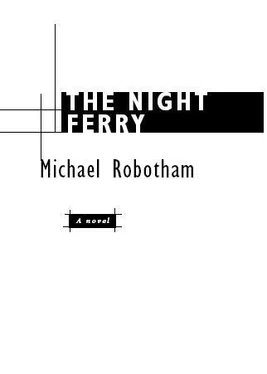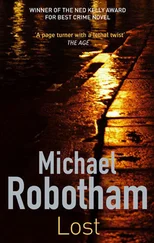I walk away from the taxi. The boy leaning against the wall has gone. The second teenager is still at the window. I walk through a concrete archway into a quadrangle. Lights shine on water. Chinese lanterns are strung from the branches of a leafless tree growing amid the weeds.
Pushing through a fire door, I climb the stairs, counting off the floors. Turning left at the landing, I find the second door. A bell sounds when I push a small white button.
Another teenager appears at the door. His polished black eyes examine me but turn away when I meet his gaze. Shoes and sandals are lined up in the narrow hallway. The teenager points to my boots. I take them off.
The floor creaks idly as I follow him to a living area. A group of five men in their forties and fifties are seated on cushions arranged at the edges of a woven rug.
Eduardo de Souza is immediately recognizable because of his place at the center. Dressed in white pantaloons and a dark shirt, he looks Turkish or possibly Kurdish, with a high forehead and carved cheekbones. Unfurling his legs, he rises and touches my hand briefly.
“Welcome, Miss Barba, I am Eduardo de Souza.”
His neatly trimmed beard is black and gray—the gray like slivers of ice hanging on dark fur. Nobody speaks or moves, yet there is a perceptible energy in the air, a sharpening of focus. I keep my gaze down as eyes roam over me.
Through the doorway to the kitchen I spy a young Nigerian woman in a flowing dress of bright colors. Three children, two boys and a girl, jostle at the doorway, regarding me with fascination.
De Souza speaks again. “These are friends of mine. This is Sunday. He is our host this evening.”
Sunday smiles. He is Nigerian and his teeth are a brilliant white. Each of the men introduces himself in turn. The first is Iranian with a Swiss German accent. His name is Farhad and his eyes are set so deep in his skull that I can scarcely see them. Beside him is Oscar, who looks Moroccan and speaks with a French accent.
Finally, there is Dayel, a smooth-shaven Indian, with an oil burn on his neck.
“One of your countrymen, although not a Sikh,” says de Souza. Dayel smiles at the introduction.
How does he know I’m a Sikh?
There is a spare brocade cushion beside him. I am expected to sit. Sunday’s wife enters the room carrying a tray of mismatched glasses and begins pouring sweet tea. Her hair is braided into a curtain of long beaded plaits. She smiles shyly at me. Her teeth are perfect and her wide nose flares gently as she breathes.
Dishes arrive. A meal. Holding his hands together, de Souza studies me above his steepled fingers, weighing up whether or not to help me. His English is perfect, overlaid with an educated British accent that is especially noticeable on the long vowels.
“This area of Amsterdam is called Bijlmermeer,” he says, glancing at the window. “In October 1992 a cargo jet took off from Schiphol and lost two engines. It buried itself into an apartment block like this one, full of immigrant families who were sitting down to an evening meal. Fifty apartments were destroyed by the initial impact. Another hundred burned afterward as jet fuel ran through the streets like a river of fire. People threw themselves off balconies and rooftops to escape the flames.
“At first they said the death toll was 250. Later they dropped the estimate to 75 and officially only 43 people died. The truth is, nobody knows the true number. Illegal immigrants have no papers and they hide from the police. They are ghosts.”
De Souza hasn’t touched the food, but seems particularly satisfied to see the others eating.
“Forgive me, Miss Barba, I talk too much. My friends here are too polite to tell me to be quiet. It is customary for a guest to bring something to the feast or provide some form of entertainment. Do you sing or dance?”
“No.”
“Perhaps you are a storyteller.”
“I don’t really understand.”
“You will tell us a story. The best of them seem to me to be about life and death, love and hate, loyalty and betrayal.” He waves his hand as if stirring the air. His amber eyes are fixed on mine.
“I am not a very good storyteller.”
“Let us be the judge of that.”
I tell him the story of two teenage girls who met at school and became best friends. Soul mates. Later, at university, one of them slept with the other’s father. He seduced her. She allowed herself to be seduced. The friendship was over.
I don’t mention names, but why would I tell them such a personal story?
Seamlessly, I begin talking about a second pair of teenage girls, who met in a city of widows and orphans. People traffickers smuggled them out of Afghanistan as far as Amsterdam. They were told that they owed a debt for their escape. Either they became prostitutes or carried a baby for a childless couple. Virgins were implanted with embryos in a ritualized form of medical rape. They were the perfect incubators. Factories. Couriers.
Even as I tell this story, a sense of alarm dries my throat. Why have I told de Souza such personal stories? For all I know he is involved. He could be the ringleader. I don’t have time to consider the implications. I don’t know if I care. I have come too far to back out.
There is a moment of silence when I finish. De Souza leans forward and takes a chocolate from a platter, rolling it over his tongue before chewing it slowly.
“It is a good story. Friendship is a difficult thing to define. Oscar here is my oldest friend. How would you define friendship, Oscar?”
Oscar grunts slightly, as though the answer is obvious. “Friendship is about choice and chemistry. It cannot be defined.”
“But surely there is something more to it than that.”
“It is a willingness to overlook faults and to accept them. I would let a friend hurt me without striking back,” he says, smiling, “but only once.”
De Souza laughs. “Bravo, Oscar, I can always rely on you to distill an argument down to its purest form. What do you think, Dayel?”
The Indian rocks his head from side to side, proud that he has been asked to speak next.
“Friendship is different for each person and it changes throughout our lives. At age six it is about holding hands with your best friend. At sixteen it is about the adventure ahead. At sixty it is about reminiscing.” He holds up a finger. “You cannot define it with any one word, although honesty is perhaps the closest word—”
“No, not honesty,” Farhad interrupts. “On the contrary, we often have to protect our friends from what we truly think. It is like an unspoken agreement. We ignore each other’s faults and keep our confidences. Friendship isn’t about being honest. The truth is too sharp a weapon to wield around someone we trust and respect. Friendship is about self-awareness. We see ourselves through the eyes of our friends. They are like a mirror that allows us to judge how we are traveling.”
De Souza clears his throat now. I wonder if he is aware of the awe he inspires in others. I suspect he is too intelligent and too human to do otherwise.
“Friendship cannot be defined,” he says sternly. “The moment we begin to give reasons for being friends with someone we begin to undermine the magic of the relationship. Nobody wants to know that they are loved for their money or their generosity or their beauty or their wit. Choose one motive and it allows a person to say, ‘Is that the only reason?’”
The others laugh. De Souza joins in with them. This is a performance.
He continues: “Trying to explain why we form particular friendships is like trying to tell someone why we like a certain kind of music or a particular food. We just do.”
He focuses on me now. “Your friend’s name is Cate Beaumont.”
Читать дальше












